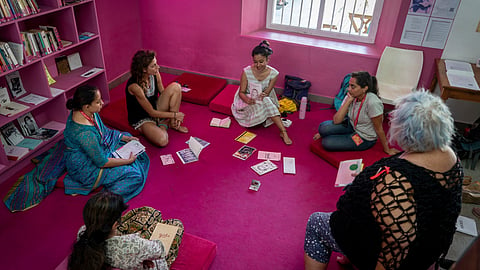
- HOMEGROWN WORLD
- #HGCREATORS
- #HGEXPLORE
- #HGVOICES
- #HGSHOP
- CAREERS
- ABOUT US
- CONTACT US

As a pick-me girl in recovery, I am constantly angry. Luckily it’s not directed towards me but the environment I grew up in, where forming connections meant compromising on my femininity. For the past few years I have been revisiting my teenage life and unearthing how brilliant and wonderful all the things that I loved were: things that I learned to shame to be the girl patriarchy wanted me to be. It makes me resentful but also alert to taking the narrative the world feeds me with a grain of salt. Because this narrative is manufactured to keep women submissive. And I’m proud of how far I’ve come. From romanticizing Kubrick’s 'method' behind, 'The Shining' that birthed that cinematic masterpiece to accepting that what he put Shelly Duvall through was abuse
History is full of stories like these, where the truth was twisted to hide injustice against women; which is why the voice of women becomes critically important, because that is possibly the only semblance of truth we will have.
Aqui Thami an artist from Darjeeling understood this early in her life and started reading books written exclusively by women. With time her collection grew and turned into a movement that manifested as the Sister Library. It started as a traveling library that toured Mumbai, Delhi, Mumbai, Pune, Bangalore, Goa, Cochin, Kathmandu, Dhaka and even Auckland with books, discussions and talks centered about womanhood, before finally finding a home in Bandra in 2019.
The library's collection is a treasure trove of female-authored works, ranging from classic literature to contemporary fiction, non-fiction, and zines. Thami carefully curates the collection to ensure that it reflects the diverse experiences and perspectives of women. Beyond books, Sister Library offers a range of activities and events, including workshops, discussions, and community gatherings. These initiatives provide opportunities for women to connect, share their experiences, and build a sense of belonging.
One of the most remarkable aspects of Sister Library is its emphasis on community building. It operates not just as a library but as a space where women can just be. Thami told Dazed in an interview that it was also intended for women from Dharavi working as domestic help in Bandra to come and use the washroom and rest for a while between their shifts. Thami believes that creating a supportive and inclusive environment is essential for empowering women. The library acts as a hub for social activism, where women can discuss important issues, raise awareness, and take collective action but it is also a safe space for them to just exist.
Sister Library is filled with books with women authors which in other libraries makes up only around 20% of the collection. The books here are also available in various regional languages like Hindi, Urdu, Tamil, Telugu, Marathi, Bengali, Assamese & Khasi. For Aqui, it’s important that the library holds space for difficult conversations around marginalized communities and that voices of women from all walks of life including indigenous women are heard. Her focus is also on the intersectionality of feminism, especially when it comes to caste and class.
I am deeply moved and inspired by everything I’ve come to learn about Sister Library. We see so much tokenism in the world around women empowerment that even conversations that are intended to drive change feel powerless and hollow. Unlike these half-baked attempts, Sister Library is an earnest endeavour to change the dynamics from within; dynamics that make women fall into patriarchal systems like competition, false notions of duty, insecurities, 'othering' due to caste, class and economic divides and in Aqui’s words, denied ‘personhood’: the privilege to be an individual without imposed gendered expectations.
By allowing both an intellectual discourse and an emotional retreat, the library acts as women's 'third place', a concept first coined by sociologist Ray Oldenberg to describe a place outside of home and work where people can connect with their community. Reflected in pink, the Sister Library unashamedly celebrates the feminine and fosters a nurturing space for sisterhood to blossom.
Follow Sister Library here.
If you enjoyed reading this, here's more from Homegrown:
A New Indian Book Aims To Spotlight The Fearless Spirit Of Muslim Women Travel Writers
The Chanakya School Is Helping Indian Women Build Futures Through Craft & Design
Immerse Yourself In The Visual Worlds Of 5 Indian Women Who Are Elevating Homegrown Art
